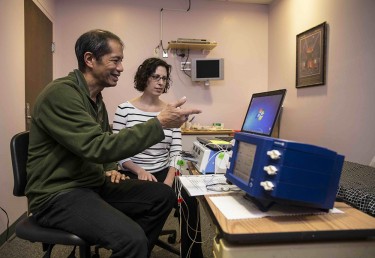Sleep Center
Center for Innovation in Sleep Self-Management
The new Center for Innovation in Sleep Self-Management (CISSM) develops, tests and implements self-management interventions to help adults and children with chronic illnesses sleep better and improve their health.
The center leverages self-monitoring technologies, such as smart home sensors that track noise, light and temperature; mobile applications that measure dietary, exercise and caffeine intake; and wrist monitors that measure sleep-wake activity and light levels. These tools allow patients to monitor their sleep behavior, set goals and receive feedback on adopting healthy behaviors.
Researchers also incorporate common data elements (CDEs) including pain intensity, fatigue, sleep disturbance, anxiety, depression, and positive affect and well-being, and technology to create a large repository that can be shared with other National Institute of Nursing Research-funded center grants, benefiting scientists and patients nationwide.
The center is funded with a $2.4 million, five-year grant from the NINR, part of the National Institutes of Health.
History
UW nurse scientists are pioneers in the sleep field. Dr. Elizabeth Giblin established the first sleep laboratory in a nursing school at UW in the late 1970s. The UW School of Nursing continues to be among only a few schools of nursing nationwide with a sleep research lab.
UW nurse scientists have collaborated with interdisciplinary colleagues to conduct sleep studies in a variety of chronic conditions including:
- Fibromyalgia with Joan Shaver, Carol Landis, and Martha Lentz
- Irritable bowel syndrome with Margaret Heitkemper and Monica Jarrett
- Menopause with Nancy Fugate Woods and Susan McCurry
- Older adults and TBI with Hilaire Thompson
- HIV with Diana Taibi Buchanan
- Children with juvenile idiopathic arthritis with Teresa Ward and Carol Landis
- Asthma with Gail Kiekhefer, Martha Lentz and Teresa Ward